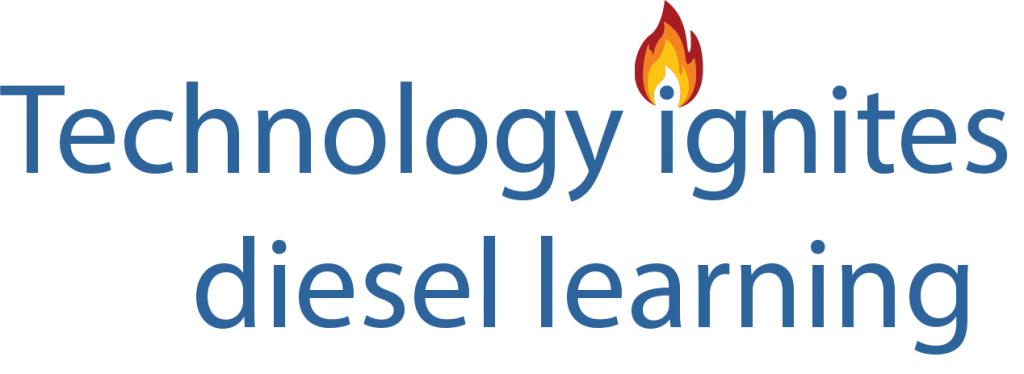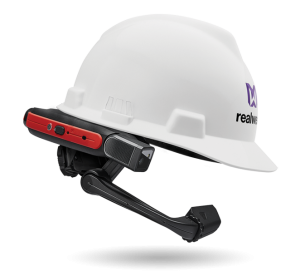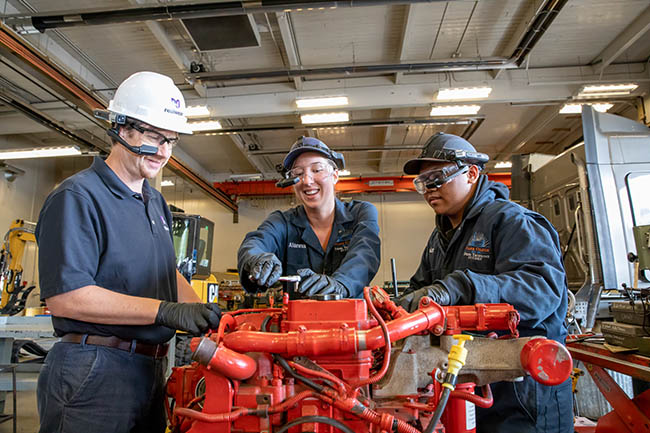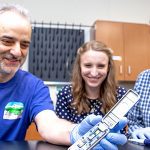Technology ignites diesel learning

Students accessing real-world learning with innovative hands-free technology
By Lily Raff McCaulou
One of southwest Washington’s hottest new technology companies is not housed in a glass-and-steel high-rise, but in a 19th century artillery barracks at Fort Vancouver. The offices have wavy glass windows and pressed tin ceilings. The conference room is filled with Victorian furniture.
“Fort RealWear” as it’s affectionately known among employees is the anachronistic headquarters of a company that makes small computers that mount on a hardhat and can be operated, hands-free, via voice command. The company, RealWear, makes headsets that are used by industrial workers, such as technicians who climb to the top of wind turbines or are harnessed onto an oil rig.
RealWear’s signature headset, the HMT-1, features a small screen that folds down from a hardhat. The screen, about the size of a pack of gum, sits just below the wearer’s dominant eye — visible but unobtrusive.
Simple voice commands allow the wearer to open files, zoom in or out, make online phone calls and even operate a Skype-style conference call so that remote workers can see what the wearer is looking at and offer advice.
This fall, the headsets will be worn by Clark College students in the Automotive and Diesel Technology programs. RealWear is donating headsets—which retail for $2,000 each—so that students can step into the future and practice using the most current technology on the market. In return, they will offer valuable feedback to the company’s engineers.
In the story of RealWear, Clark College also plays an important — albeit unlikely — role in bringing the company to Vancouver.
RealWear’s high-tech gadget was designed by Chris Parkinson, the company’s co-founder and chief technical officer. Parkinson, who grew up north of London, moved to Richland, Wash., in 1996 for a two-year post-doctoral post at the Hanford nuclear site. There he met his wife, Katie Smith, who is a native of the Tri-Cities.
As the Parkinsons married and started their family, Chris spent eight years working remotely for a Boston company called Kopin, developing a tiny computer that can be worn as a headset. In 2014, he left Kopin and negotiated the rights to the technology. He and three business partners founded a company they called WearNext to manufacture and market the headsets. Though Parkinson was working out of eastern Washington, the company was headquartered in Silicon Valley.
By the middle of 2016, CEO Andy Lowery had secured several million dollars in startup funding for the venture which by then had been renamed RealWear. As the company began manufacturing the wearable devices, the businessmen also began to reassess their projected budget.
 Fort RealWear
Fort RealWear
For the company to succeed, it would need to grow. Projected costs — especially staff — were astronomical. According to Zillow, the median price of a home in San Jose, Calif., in the heart of Silicon Valley, is $1.08 million. They searched up and down the West Coast for other options.
Southern California was too expensive. Seattle had too much traffic and wasn’t much cheaper.
During their search, Parkinson’s wife, Katie Smith, was invited to an event at Clark College, her alma mater. As a student athlete, Katie played on the college’s basketball team. In March 2017, she was inducted into Clark’s Athletic Hall of Fame.
While she was in town, Katie went on her morning jog and happened to wind through the Fort Vancouver historic site. She stopped to read a few signs about the buildings being refurbished and offered for rent to local businesses. When she got back to her hotel, she called her husband and suggested he check out the site. He took her advice and suggested to his business partner, CEO Andy Lowery, that they visit Southwest Washington together.
Lowery, who spent 11 years in the United States Navy and 14 years in the Navy Reserves before retiring in 2017, was charmed by the site’s military history. Shortly after he and Parkinson saw the area, they signed a five-year lease in the Fort Vancouver National Historic Site that they now affectionately call “Fort RealWear.”
The Artillery Barracks at Fort Vancouver has its own connection to Clark. Displayed on the front wall of what is now the RealWear office is a framed photo of Clark College President Robert K. Knight. Before joining the college, Knight, who was a lieutenant colonel in the U.S. Army, served as the last commanding officer for Fort Vancouver. He oversaw the decommission of the military facility.
Warm welcome
In addition to the charm of neatly trimmed green grass, stately white military barrack buildings and cul-de-sac traffic flow, a $200,000 grant from the state of Washington helped sweeten the deal by helping RealWear pay to relocate from California. In August 2017, the company’s executives, employees and their families gathered in the space to assemble IKEA office furniture.
City officials in Vancouver laud RealWear as a local success story — an example of Vancouver’s ability to lure a Silicon Valley company away from that high-tech destination. And RealWear leaders said they’re enjoying life as big fish in the small pond of Vancouver. The city’s mayor at the time, Tim Leavitt, who is a Clark alumnus, delivered a speech in the company’s new headquarters. The local newspaper, The Columbian, reports frequently on RealWear. Washington Gov. Jay Inslee visited the office this spring.
“It’s a wonderful feeling to be special,” Parkinson said.

Alanna Lawrence ’18 (center) and Blaize Oasay-Sabug ’18, June graduates of Clark’s Diesel Technology program, learn about the hands-free technology from Chris Parkinson, RealWear co-founder. Photo by Jenny Shadley
We’re hiring
Lowery said some investors were concerned that if the company left Silicon Valley it might struggle to recruit top-notch talent. That hasn’t been the case, he said. In fact, RealWear’s location has helped the company stand out from its competition when it comes to making new hires.
To recruit an engineer in Silicon Valley, for example, would require offering an annual salary of $150,000. In Vancouver, where the median home price is $304,500, RealWear can offer a $90,000 salary and employees can stretch that money further.
“The cost of living is a lot less here,” Lowery said.
For younger employees who want to live amid the urban thrum, downtown Portland — against the flow of rush hour traffic—is a quick, easy commute from Vancouver. For employees with families, the Vancouver area offers relatively spacious, affordable homes. And RealWear isn’t competing with Google and Facebook for talent.
RealWear plans to hire an additional 40 employees by the end of the year, and Clark College is poised to provide those workers to the business, complete with first-hand experience with their products.
Parkinson said that as the maker of a product used by industrial workers, it’s serendipitous to have an industrial educator like Clark College down the street. Students will be testing the technology and providing quick feedback that helps the company make design decisions.
“It’s an exciting partnership,” said Don Gonser, professor of Diesel Technology and department chair at Clark.
For Clark students, using the wearable computers provides a valuable preview of life after graduation in the high-tech private sector. That’s the kind of experience that makes a Clark education even more relevant in the real world.
In addition to its connection to Clark, RealWear is partnering with engineering students at Washington State University Vancouver to help with the product and software design. The company is designing an internship program for students at both institutions.
“Our headset is very much about helping to train people,” Parkinson said. One of the most common ways companies use the RealWear computers is by fitting it onto an employee who works in the field but regularly needs to communicate with more senior colleagues.
“The hands-free technology means you can send a junior guy in to mend a turbine and he can use the computer to follow what to do or (use the) video chat feature to get the real-time advice of someone with more experience.”
In other words, RealWear headsets are just one more way Clark helps students prepare for their careers by training with relevant and innovative technology. The hands-on learning prepares them for the 21st century workforce and high-paying jobs.
~~~~~~~~~~~
Lily Raff McCaulou is a journalist whose writing has appeared in The New York Times, The Atlantic and The Guardian. She lives in Bend, Ore.



